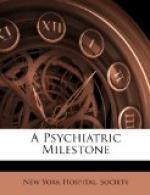Of special importance also are the experiences of childhood. An unhappy home or unjust treatment as a child may warp the development of the personality, lead to a lack of self-confidence, to the predominance of one emotional tendency, and so prevent that balanced equilibrium which will allow a rapid and suitable emotional reaction such as we may consider normal. This may lead to a failure of development or a loss of the sense of value, because the existence of one dominating emotional tendency so often produces a prejudiced view which may render a just appreciation of our general experience almost impossible and may seriously disturb our mental activity.
And if, as Bianchi suggests, all mental activity depends on a series of reflex actions, or, as Bechterew and Pavlov have insisted, a series of conditioned reflexes becomes established, it will assist us to understand how such stimuli can give rise to mental disturbances, to mental illnesses. We shall see that there may be something of real importance underlying such remarks as “I felt I was a changed child”; or “It is because of the treatment I received from my father that I have taken life so seriously.” “I have never imagined that what I went through in my childhood could so influence me now”; or “I have never had confidence in myself and often when I have appeared vivacious and interested I have had an awful feeling of incapacity and dread within myself.”
The outward and obvious manifestations, therefore, are not necessarily a true index of our mental and emotional conditions. This is true of all mental illnesses, even the most severe.
One patient who had been in an asylum more than ten years illustrated this in a most striking manner. His outward manifestations led one to feel that he thought he possessed the institution in which he was confined and also the surrounding property and that the authorities were a set of usurpers and thieves who kept him incarcerated in order that they might enjoy what was really his money and his property. On one occasion I said to him, “George, what is that incident in your life which you cannot forget and which has troubled you so seriously?” The reply was a flood of abuse. I put the question to him several times without getting any further answer, but when I came to leave the ward, George came up behind me and whispered over my shoulder, “Who told you about it?” No abuse, no shouting as usually occurred, but a whisper, “Who told you about it?” Was not George running away from a memory with its emotion which was unbearable to an idea which allowed him to be angry with others instead of with himself? Many examples of this might be given and really might be found by us in our own experience. It is the mental content which is important, a mental content which can be recalled by various stimuli, and which will be more persistently with us the more intense is the emotion associated with it.
But the basis of the condition is not completely understood when we have apparently arrived at the psychic cause of the disturbance.




